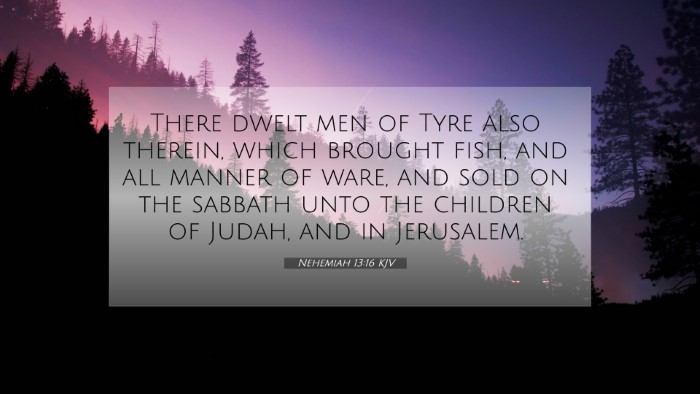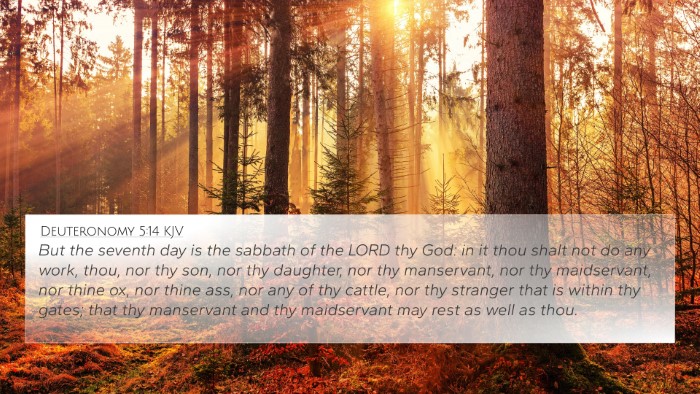Understanding Nehemiah 13:16
Verse: Nehemiah 13:16 pertains to the prohibition of trade on the Sabbath and the consequences of ignoring this divine command.
Contextual Analysis
In Nehemiah, the focus is on the restoration of Jerusalem and the reestablishment of proper worship and community practices. Nehemiah, as a leader, emphasizes adherence to the Law of Moses, reflecting a concern for the holiness of the Sabbath.
Commentary Insights
This verse highlights the vital relationship between obedience to God’s commandments and the well-being of the community. The commentaries provide a rich tapestry of understanding:
- Matthew Henry: Emphasizes the necessity of keeping the Sabbath holy, linking this to the covenant relationship between God and His people. He notes that the failure to observe the Sabbath leads to spiritual decay.
- Albert Barnes: Points out the practical implications of this disobedience. He asserts that the consequences of trading on the Sabbath affected not just the transgressors, but the entire community, fostering a culture of disrespect towards God's commands.
- Adam Clarke: Highlights the historical context of the people of Israel, revealing the cultural tensions that arose when foreign traders exploited the Sabbath for profit. Clarke underscores the prophetic nature of the Sabbath as a sign of covenant loyalty.
Biblical Cross References
This verse can be cross-referenced with several other scripture passages that elucidate its significance:
- Exodus 20:8-11: The command to keep the Sabbath day holy, establishing a foundational principle for the Israelites.
- Isaiah 58:13-14: A call to honor the Sabbath and find delight in it as a means of spiritual fulfillment.
- Jeremiah 17:21-23: A warning against the violation of the Sabbath and the dire consequences that follow.
- Ezekiel 20:12: God’s declaration of the Sabbath as a sign between Him and Israel, celebrating the covenant relationship.
- Mark 2:27: Jesus emphasizes that the Sabbath was made for man, not man for the Sabbath, bringing a new understanding of rest.
- Hebrews 4:9-10: Discusses a “Sabbath rest” that remains for the people of God, connecting both physical and spiritual rest themes.
- Nehemiah 10:31: An earlier commitment to not engage in trade during the Sabbath reaffirms Nehemiah's call for obedience.
Thematic Connections
Nehemiah 13:16 invites readers to explore various themes within Scripture:
- Holiness and Covenant: The emphasis on Sabbath observance calls to mind the covenant faithfulness God desires from His people.
- Community Responsibility: The implications of individual actions on community integrity underline the necessity of social ethics rooted in divine law.
- Prophetic Warnings: There is a recurring theme of prophets warning against disobedience and calling for return to covenant practices throughout the Old Testament.
- Jesus' Teachings: Understanding the Sabbath through Christ's eyes reflects a deeper spiritual intent that transcends mere legalism.
Practical Applications
The teachings in Nehemiah 13:16 remain relevant today, offering insights into rest, community ethics, and spiritual commitment. Reflecting on this verse can guide individuals in:
- Prioritizing Sabbath Rest: Recognizing the need for spiritual rejuvenation in a busy world.
- Engaging in Community Practices: Understanding the effects of individual actions on the broader community.
- Reassessing Spiritual Commitments: Encouraging a return to foundational practices that foster a deeper relationship with God.
Conclusion
Nehemiah 13:16 serves as a powerful reminder of the significance of obeying God's commands, particularly regarding the Sabbath. By cross-referencing this verse with other biblical texts, one can uncover rich thematic connections and deepen one’s understanding of God's covenant relationship with His people.
For those engaged in Bible verse cross-references and linking Bible scriptures, this verse provides an excellent example of how to identify connections between Bible verses and can enrich any Bible reference resource.




